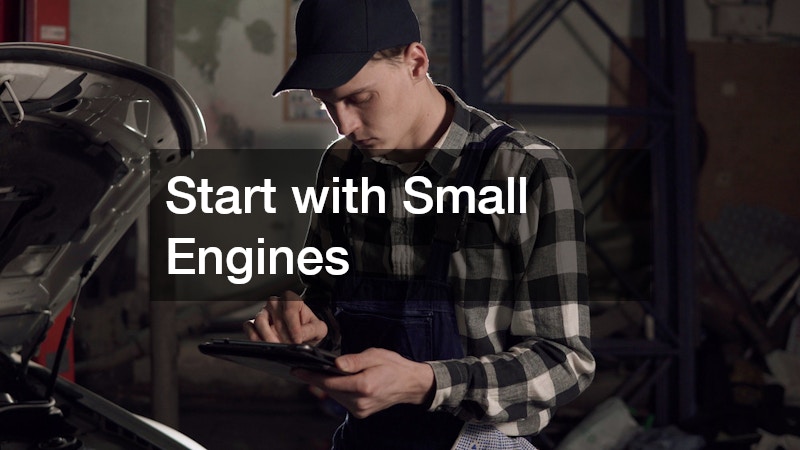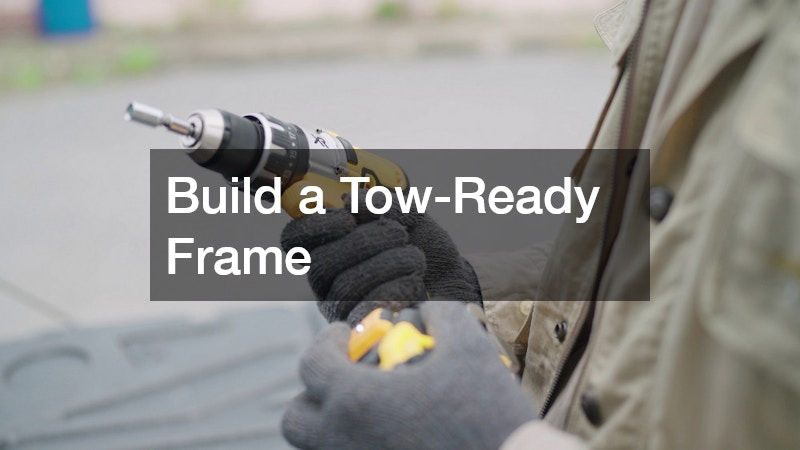Finding common ground with your teen can be one of the most rewarding challenges of parenthood. When your child happens to have a passion for gears, motors, and tools, you’ve got an incredible opportunity to connect through shared hands-on experiences. These kinds of moments don’t just teach practical skills. They foster communication, teamwork, and creativity. Whether your garage is already a go-to space for weekend tinkering or you’re looking to encourage a budding interest, there’s no shortage of fun project ideas to explore together.
This article presents a curated list of engaging, skill-building projects specifically designed for parents and their mechanically inclined teens. Each idea aligns with real-world tools, trades, and technologies that allow for both creativity and learning. From starting small with engine work to exploring the basics of fabrication and mobility, these projects can serve as educational gateways and even spark career interests down the road.
The activities in the following sections are arranged in a natural, skill-building progression. You’ll begin with simpler concepts like understanding small engines and repurposing parts, then move into more advanced tasks such as building towable frames or customizing mobile spaces. Along the way, there are opportunities to work with tools, learn about safety, and experiment with a wide range of mechanical systems. By engaging in these projects, you’ll not only have quality bonding time with your teen, but you’ll also help them sharpen their confidence, mechanical instincts, and problem-solving abilities.
Whether you’re planning a summer full of weekend builds or just looking for a rainy-day task with some grit, this guide will offer inspiration. Read on for a mix of practical suggestions, meaningful connections, and real-world applications that make learning both purposeful and genuinely fun.
1. Start with Small Engines

Working with small engines is a great way to introduce teens to the world of mechanics in a manageable, hands-on environment. Lawn mowers, go-karts, or minibikes offer accessible platforms for learning how combustion engines function, giving them foundational knowledge about internal systems and how mechanical components work together. These beginner-friendly projects are perfect for sparking interest and building confidence with tools.
One of the most approachable fun project ideas is to disassemble and rebuild a small gas-powered engine. With some basic guidance and safety gear, your teen can gain a firsthand understanding of tasks like spark plug replacement, carburetor cleaning, or diagnosing ignition issues. These are the kinds of practical experiences that encourage curiosity while building fine motor skills and mechanical awareness.
Beyond basic repairs, these projects also help teens appreciate the structure of machines, teaching valuable lessons in patience, sequencing, and observation. For parents, this is a chance to mentor through problem-solving rather than lecture-based instruction. The payoff is seeing your teen become more capable, more confident, and maybe even more passionate about pursuing technical hobbies or careers, such as an auto mechanic, in the future.
2. Explore Custom Builds
Custom builds are a step up in both creativity and complexity, giving families the chance to turn something simple into something spectacular. Whether it’s modifying a recreational vehicle or adding custom touches to an existing machine, these projects encourage critical thinking, measurement, and collaborative design. They’re also a perfect excuse to dive into the world of upgrades, conversions, and accessories.
One of the more exciting fun project ideas involves transforming a used golf cart into a personalized cruiser. Start by studying basic electrical systems, then consider how to enhance comfort or performance—adding lights, upgrading wheels, or installing a sound system. Some companies even offer short-term golf cart rentals that let you try out different styles before committing to a full purchase, which can give your teen exposure to a variety of mechanical formats.
This kind of work helps bridge creativity and technical skill. Teens learn how to work within real constraints—budget, space, and capability—while still making the project their own. It’s also a great opportunity to introduce concepts like planning, budgeting, and shopping for parts, offering life skills alongside mechanical growth.
3. Try a Mobile Workshop

As your teen’s interests grow, so will the need for space and organization. Creating a mobile or stationary workshop can be one of the most fulfilling and fun project ideas, offering a dedicated spot for tools, parts, and work in progress. It’s a chance to teach practical building skills while designing a functional space that evolves with your shared interests.
One innovative approach is repurposing a large, steel shipping container into a mobile workshop. These units can be retrofitted with shelving, electrical setups, and secure storage for tools and components. With guidance, your teen can help design and build the layout, learning about insulation, ventilation, lighting, and space optimization in the process. It’s both a structural and mechanical challenge that brings together carpentry, planning, and creative problem-solving.
Working on this kind of space gives teens ownership over their environment and encourages responsibility when it comes to tool maintenance and project organization. It also turns into a long-term hub for continued tinkering and collaboration, showing that mechanics isn’t just a hobby. It can be a lifestyle centered on curiosity and hands-on growth.
4. Fix Up an Old Ride
Restoring an older vehicle or vessel is a meaningful way to blend fun project ideas with practical mechanical experience. Taking on a fixer-upper—especially one that’s seen better days—gives teens the chance to learn patience, planning, and perseverance. It’s also a great opportunity for both of you to dive into a longer-term commitment that offers educational rewards with every step.
One unique and often overlooked option is repairing an old watercraft. Used boats can be found in a variety of conditions and price ranges, and many of them need attention to electrical systems, hull integrity, or engine components. This kind of project challenges your teen to think about corrosion, waterproofing, buoyancy, and safety in a hands-on way that differs from land-based mechanical work.
Beyond just restoring function, your teen can explore ways to improve performance or add personal touches, like repainting, installing updated navigation lights, or adding custom seating. These projects combine marine mechanics with design thinking and make for memorable weekends filled with discovery. Working together to bring an old ride back to life also reinforces the value of dedication and long-term planning.
5. Design a Hauling Rig

Designing a hauling solution is a highly practical challenge that ties together structural thinking and mechanical know-how. It’s one of those fun project ideas that introduces load-bearing concepts, weight distribution, and hitch systems, all while promoting collaboration and safe engineering.
A great way to start is by exploring a basic utility frame, especially if you’re eyeing a trailer for sale that needs repairs or enhancements. Together, you can reinforce the frame, check the axle and bearings, or rewire the lights. Your teen will gain valuable exposure to the function and fit of mechanical systems, and you’ll both get hands-on time with essential shop tools.
These types of projects don’t just serve a technical purpose—they also solve real logistical challenges. Maybe you’ll use the trailer to haul materials for future builds, or maybe it becomes a transport platform for other hobbies. Either way, your teen will develop both mechanical skills and a deeper understanding of applied design principles.
6. Master Outdoor Repairs
Not every mechanical project needs to involve engines—outdoor repairs and improvements can be equally challenging and satisfying. Tasks that deal with structure and terrain, such as setting a strong foundation or repairing surfaces, are fantastic fun project ideas for teens interested in expanding their practical knowledge beyond the garage.
One excellent avenue is working with materials used in hardscaping. You might investigate how to level a work pad, set up a stable structure, or patch a cracked driveway. Partnering with professionals who offer concrete services, or even renting the tools and materials yourself, allows you to give your teen a crash course in mixing, forming, and setting.
These projects are physically engaging and teach about durability, weather resistance, and the importance of proper preparation. They also instill a strong sense of accomplishment when the job is done right. For a teen who loves tools and tangible results, there’s real satisfaction in turning raw materials into something solid and useful.
7. Build a Tow-Ready Frame

Constructing a tow-ready frame from the ground up is one of the more advanced fun project ideas for teens who are ready to apply serious skills. It combines welding, structural design, and understanding of road safety. It’s also a long-term investment in learning, with outcomes that are both functional and confidence-building.
A good place to begin is by picking up materials during a local trailer sale, especially if you can find a basic kit or frame that needs reinforcement. From there, your teen can help cut, align, and mount various components under your supervision. You can walk through how to ensure proper alignment of axles, tire positioning, and brake integration, which teaches attention to detail and mechanical planning.
This kind of project helps teens learn about road regulations, weight ratings, and safety checks. Once completed, your newly built trailer could be used for future projects—whether hauling supplies, transporting other builds, or supporting community activities. It’s a hands-on experience that delivers both skill and real-world utility.
8. Learn About Components
Understanding how mechanical systems come together often starts with the individual components. Fun project ideas that focus on parts—rather than the whole—allow teens to learn from the inside out. It also builds appreciation for how even small mechanical failures can affect overall function.
A great way to explore this is by studying nd replacing trailer parts. Begin with something basic like swapping out bearings or upgrading couplers and lighting harnesses. It’s a step-by-step approach to system awareness and a great introduction to maintenance routines. You can even simulate failures to help your teen diagnose problems and find solutions independently.
This type of hands-on learning creates a deep mechanical vocabulary and sharpens diagnostic thinking. As your teen becomes familiar with different systems, they gain the confidence to take on larger projects—and understand how to troubleshoot if something goes wrong. It’s a practical education wrapped in real-world relevance.
9. Rent to Experiment
Not every project requires ownership of expensive gear. One of the smartest fun project ideas is to experiment with short-term access to professional tools. This allows teens to try their hands at different trades and techniques without the upfront cost.
Equipment rentals open the door to a wide variety of opportunities. From lifts and compressors to specialty tools for cutting or shaping, these resources help teens understand the value of using the right tool for the right job. A weekend with a rented welder or jackhammer, for example, can turn into a crash course in responsibility and technique.
This approach also teaches project planning—evaluating which tools are needed, budgeting for usage time, and ensuring safe handling. It provides low-risk exposure to high-impact learning and shows teens that preparation and resourcefulness often matter just as much as hands-on skill.
10. Look into Trade Paths
Eventually, some fun project ideas turn into something more—a possible career path. For teens who take a deep interest in fabrication or repair, it’s worth exploring options that offer real-world experience and mentorship. One powerful example is an entry-level program designed for hands-on learners who thrive in technical environments.
An introductory welding apprenticeship can give your teen their first look into the skilled trades in a supervised, structured environment. This is more than just a hobby—it’s a stepping stone into a lifelong craft. Apprenticeships teach proper technique, material handling, and safety while giving your teen the chance to work alongside professionals.
By turning passion into direction, these programs validate your teen’s interests and offer a roadmap toward a future they might not have considered. Whether or not they pursue it long-term, the knowledge gained through this kind of structured learning will benefit all future mechanical endeavors.
Learning Together
Working side-by-side on hands-on projects is one of the most effective ways to connect with a mechanically inclined teen. It’s not just about fixing engines or building things—it’s about cultivating curiosity, independence, and resilience. This blog has offered a range of fun project ideas tailored to encourage both learning and bonding, whether you’re tackling basic engine maintenance or exploring more advanced setups like building custom trailers or repurposing workspaces. These experiences offer a mix of technical education and meaningful life skills. They show your teen that hands-on work is valuable and that creativity and discipline go hand in hand.
The beauty of these projects lies in their scalability. You can start small, maybe by fixing up an old ride or working on a concrete pad, and move toward bigger, more complex builds as your teen’s abilities develop. By supporting their interest in mechanics, you’re helping to shape not only their technical skills but also their ability to think critically, solve problems, and take pride in their work.
These fun project ideas are about more than building machines. They’re about building relationships, building confidence, and opening doors to future opportunities that are as real as the tools in your hands.

